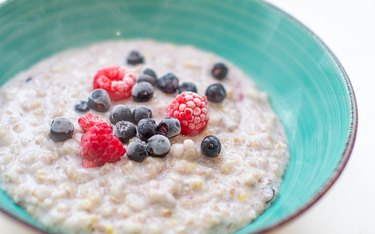
Starting off each morning with a warm bowl of oatmeal is great for your heart, but if you are one of the 8 million people who live with painful gout, this shouldn't be an everyday thing.
A form of arthritis, gout is marked by swollen and inflamed joints. It typically strikes your big toe first, but gout can affect any joint, according to the Centers for Disease Control and Prevention. Once known as the "disease of kings" or "rich man's disease," gout was thought to be caused by overindulging in rich food and drink, but this has been largely debunked.
Video of the Day
Video of the Day
Now researchers believe gout occurs when uric acid builds up in your bloodstream because your kidneys can't remove it efficiently. When this happens, crystals of uric acid form around the joints, causing gout pain and inflammation. Uric acid is a naturally occurring waste product that mainly comes from foods that are high in purines, according to the Academy of Nutrition and Dietetics.
The Effects of Oatmeal on Gout
"While oatmeal does contain some purines, it does not have an excessively high number, so it is OK to eat in moderation," says Michael Toprover, MD, a rheumatologist at NYU Langone Health in New York City. Oatmeal doesn't reduce uric acid, but it also doesn't cause joint pain on its own, he says.
There are foods to avoid with gout due to their high purine content. According to Dr. Toprover, the list includes:
- Sardines
- Anchovies
- Shrimp
- Scallops
- Mussels
- Liver
- Kidneys
- Sweetbreads
- Red meat
"Foods with a lot of high-fructose corn syrup — including non-diet soda, certain fruit juices, processed sweets and alcohol, particularly beer and whiskey — should also be avoided," Dr. Toprover says.
Oatmeal has about 50 to 150 milligrams of purines per 100 grams, says Dana Greene, RD, LDN, a registered dietitian in Brookline, Massachusetts. "By contrast, meat and fish contain about 120 to more than 400 milligrams of purine per 100 grams," she says.
Greene typically recommends the DASH diet — short for Dietary Approaches to Stop Hypertension — for people with gout, as outlined by the National Heart, Lung, and Blood Institute. "Many people with gout also have high blood pressure, so this is a win-win," she says.
The DASH diet is rich in vegetables, fruits, whole grains, fat-free or low-fat dairy products and lean proteins like fish or chicken. It's also light on fatty meats, full-fat dairy products and sugar-sweetened beverages and snacks. "There has also been research that shows that the DASH diet lowers uric acid levels," Greene says.
Research in the May 2017 issue of the BMJ backs up this advice. In 26 years of follow-up of more than 1,700 people who identified as men, the study found that those who most closely followed the DASH diet had a lower risk for gout, while their counterparts who favored a more Westernized diet that was loaded with red meat, french fries and sweets were at higher risk for developing gout.
Breakfast With Gout
So what should you eat for breakfast if you have gout?
Oatmeal is rich in fiber to help you feel full longer, which can keep weight gain to a minimum and can help lower blood cholesterol levels, Greene says. "High cholesterol and obesity are major risks for heart disease, so oatmeal does have a place in a heart-healthy diet, and it's OK to eat it a few times a month if you have gout."
Greene often recommends these options for breakfast to people with gout:
"There are no great studies regarding specific foods that lower uric acid, but a healthy breakfast with whole grains, fruits and/or low-fat dairy are all good to have in general and not bad for gout," Dr. Toprover says.
Diet changes are not replacements for other gout treatments. Many people with gout will need to take medication to lower uric acid, Dr. Toprover says. Talk to your doctor or a dietitian to make sure you are doing everything you can to keep painful gout attacks at bay.
Read more: Why Nuts Are Good for Gout
- Centers for Disease Control and Prevention: “Gout”
- Academy of Nutrition and Dietetics: “Gout”
- Michael Toprover, MD, rheumatologist, NYU Langone Health, New York, New York
- Dana Greene, MS, RD, LDN, registered dietitian, Brookline, Massachusetts
- National Heart, Lung, and Blood Institute: “DASH Eating Plan”
- The BMJ: “The Dietary Approaches To Stop Hypertension (Dash) Diet, Western Diet, and Risk of Gout in Men: Prospective Cohort Study”
Is this an emergency? If you are experiencing serious medical symptoms, please see the National Library of Medicine’s list of signs you need emergency medical attention or call 911.